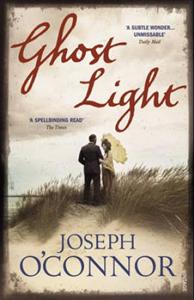 This is not a review, so much as an explanation of why I (probably) will not finish Ghost Light by Joseph O’Connor. The book was a present from my father for Christmas, a continuation of his very pleasant habit of buying us all a paperback – quite frequently he buys something he wants to read himself rather than something he has read, which is possibly riskier, but also more fun. In this case, I was quite pleased, as I’ve been wanting to read Joseph O’Connor. Then the book drowned in some pile or another and resurfaced recently, so I started it. And, well, I think I still want to read some Joseph O’Connor, but not this book.
This is not a review, so much as an explanation of why I (probably) will not finish Ghost Light by Joseph O’Connor. The book was a present from my father for Christmas, a continuation of his very pleasant habit of buying us all a paperback – quite frequently he buys something he wants to read himself rather than something he has read, which is possibly riskier, but also more fun. In this case, I was quite pleased, as I’ve been wanting to read Joseph O’Connor. Then the book drowned in some pile or another and resurfaced recently, so I started it. And, well, I think I still want to read some Joseph O’Connor, but not this book.
The synopsis from Adlibris reads: «Dublin, 1907. A young actress begins an affair with a damaged older man, the leading playwright at the theatre where she works. Many years later, Molly, now a poverty-stricken old woman, makes her way through London’s bomb-scarred city streets, alone but for a snowdrift of memories.»
Which is all well and good. I have two main objections, though:
Firstly: We’re talking real people here. The playwright in question is E. J. M. Synge, the actress Molly Allgood, stage name Maire O’Neill. And I’m not a big fan of fictionalization of real people’s lives on the whole. Sometimes it works well, of course, there are exceptions to every rule, but in general I’d rather read a straight-forward biography (though, frequently, they are largely fictionalized, too, which also annoys me…) or a purely fictional novel. Let your novel be inspired by real events, by all means, but don’t as a narrator puport to know what a real person was thinking and feeling, even if you acknowledge in the fore- or afterword that of course, you have no idea. Or, rather, do, but don’t expect me to read the book. I know a lot of people love this sort of thing. To each his own.
Secondly, and more importantly: Most of the book so far (page 35) is written in the second person narrative (and I’ve glanced at later pages and this seems to go on for most of the remaining 205 pages as well). There is a very good reason why this form of narrative is very seldom used and that is that it VERY seldom works. And it doesn’t. Not for me, anyway. I feel alienated, not included. Sorry. I just can’t with it.
So, no.
On the other hand, my copy has 18 glowing quotes from various reviews on the first couple of pages, so I guess O’Connor is doing alright even if I give up.